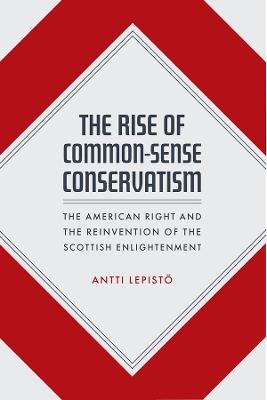
The Rise of Common-Sense Conservatism
University of Chicago Press (Verlag)
978-0-226-77404-6 (ISBN)
In considering the luminaries of American neoconservative thought—among them Irving Kristol, Gertrude Himmelfarb, James Q. Wilson, and Francis Fukuyama—Lepistö argues that the centrality of their conception of the common man accounts for the enduring power and influence of their thought. Intriguingly, Lepistö locates the roots of this conception in the eighteenth-century Scottish Enlightenment, revealing how leading neoconservatives weaponized the ideas of Adam Smith, Thomas Reid, and David Hume to denounce postwar liberal elites, educational authorities, and social reformers. Their reconfiguration of Scottish Enlightenment ideas ultimately gave rise to a defining force in modern conservative politics: the common sense of the common man. Whether twenty-first-century politicians who invoke the grievances of “the people” are conscious of this unusual lineage or not, Lepistö explains both the persistence of the trope and the complicity of some conservative thinkers with the Trump regime.
Antti Lepistö is a lecturer in the Department of the History of Science and Ideas at the University of Oulu, Finland.
Introduction: Speaking for the People in Culture Wars–Era America The Ordinary American as a Neoconservative Concept and Moral Authority
Neoconservatives and Populist Persuasion
The Neoconservative Culture Wars
Chapter 1. The Coming of the Neoconservative Common Man The Rise of Neoconservatism and the Idea of Democratic Decadence
The Economic Crisis of the 1970s and the Neoconservative Discovery of Adam Smith
The Morality of Ordinary People in Scottish Philosophy
Irving Kristol on Shared Moral Sentiments and the Bourgeois Way of Life
The Sentimentalist Enlightenment: A Neoconservative Interpretation
Speaking for Average White Americans: Neoconservatives and the Republican Party
Chapter 2. James Q. Wilson and the Rehabilitation of Emotions Emotions as a Way of Knowing
How Ordinary People Think
The Man within the Average Joe’s Breast
Chapter 3. Family Values as Moral Intuitions: Neoconservatives and the War over the Family The Emergence of Family Values as a Neoconservative Theme
The New Era of Sentiment in American Politics: Irving Kristol’s Family Wars
The Moral Sense as a Policy Compass: James Q. Wilson on Abortion and Gay Marriage
A Neoconservative Philosophy of Moral Education
The Battle over Nonjudgmentalism and the New Definitions of Deviancy
Chapter 4. Moral Sentiments of the Black Underclass: Race in the Neoconservative Moral Imagination The Discovery of the Underclass: Urban Decay as a Question of Character
The Wise and Virtuous Everyman and Other Americans in James Q. Wilson’s The Moral Sense
A Poor Man’s Moral Sense and the Ethic of Self-Help
Chapter 5. Retributive Sentiments and Criminal Justice: James Q. Wilson on Crime and Punishment The Mid-1990s Tough-on-Crime Frenzy and Wilson’s Penal Populism
Moral Sentiments and Criminal Justice
Neoconservative Moral Sentimentalism, Color Blindness, and Mass Incarceration
Chapter 6. Elite Multiculturalism and the Spontaneous Morality of Everyday People: Francis Fukuyama’s Culture Wars Straussian Cultural Pessimists and the Failures of Liberalism
The Liberal Democratic Citizen and the Lost Thymos
Losing the Language of Straussian Pessimism: Fukuyama’s Moral Sense Idea
Fukuyama’s Culture Wars: Elite Multiculturalism versus Popular Moral Sentiments
The Moral Sense and Spontaneous Order: Neoconservative Moralism Meets the Neoliberal Order
Epilogue: Neoconservative Culture Warriors and the Boundaries of the People
Acknowledgments
Notes
Bibliography Unpublished Primary Sources
Published Primary Sources
Secondary Literature
Index
| Erscheinungsdatum | 20.05.2021 |
|---|---|
| Sprache | englisch |
| Maße | 152 x 229 mm |
| Gewicht | 513 g |
| Themenwelt | Geschichte ► Allgemeine Geschichte ► Neuzeit (bis 1918) |
| Geisteswissenschaften ► Geschichte ► Regional- / Ländergeschichte | |
| Sozialwissenschaften ► Politik / Verwaltung ► Politische Theorie | |
| ISBN-10 | 0-226-77404-X / 022677404X |
| ISBN-13 | 978-0-226-77404-6 / 9780226774046 |
| Zustand | Neuware |
| Haben Sie eine Frage zum Produkt? |
aus dem Bereich


